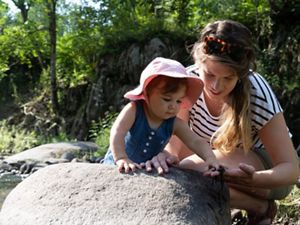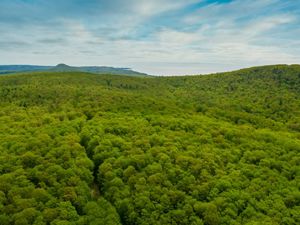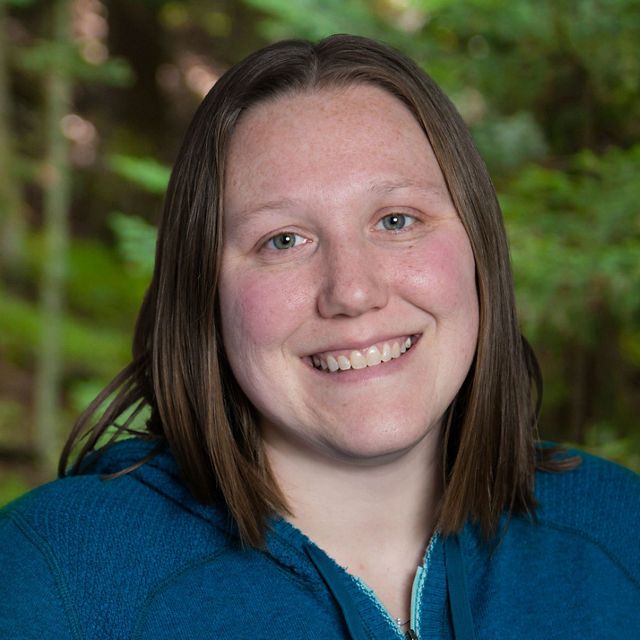A Lifelong Journey in Science
From a seasonal staffer to the Director of Land and Water in Michigan, TNC’s Emily Clegg is helping pave the way for women in science.
My first foray into the world of natural science was a 5th grade, three-day trip to the local outdoor education center. I remember learning about wolves and pack dynamics, garlic mustard and prairie restoration. My mom claims I came home and told her I wanted to go to school outside for the rest of my life. Natural science was just something I always knew I was going to do.
And that's what I did. I was fortunate enough to learn about The Nature Conservancy (TNC) as an undergrad and worked two summers as a seasonal staff member out of the Marquette office. Since joining TNC full-time, I've done almost every field job that you can. I've been a forest agreement expert, partnership manager and have planted an enormous number of trees. Now, as the Director of Land and Water Management, I look forward to using these experiences to continue building partnerships across the state. Together, I know we can get more done for the planet.
Quote
Natural science was just something I always knew I was going to do.
From Student to Conservation Professional
I knew that to be a contender in the natural resources field, I would need to get a master’s degree. Getting through my program was rough. I struggled with the statistics portion of my research, and it was my first time doing true natural resource project management. The tribe that worked with our lab was depending on my data and results to make resource management decisions.
Latest News
Get the latest updates about conservation work in Michigan.
My advisor was very supportive and saw how much I was struggling and gave me great advice that I still carry around today: that I don’t have to be the best at everything or have all of the answers. If I don’t know how to do something, there are people that can help fill in the weak areas.
It wasn’t easy to admit that I needed help, so learning to ask for it was a mind-opening lesson. It also proved to be an important one. In my work at TNC, I’m fortunate to partner with experts across the state. We share information, ideas, and help each other as we work to protect our planet.
Quote
In my work at TNC, I’m fortunate to partner with experts across the state. We share information, ideas, and help each other as we work to protect our planet.
Journey at TNC
I’ve come a long way since my master’s degree. My time at TNC has been full of projects—from big land deals to forest partnerships. I’ve worn a lot of hats and worked with a lot of incredible Michiganders. These are just a few of the projects that I’m most proud of.
Four-Year Project on the Two-Hearted River
I completed the Two-Hearted River Connectivity and Sedimentation Project over four years which included road-stream crossing replacements and bank stabilizations at 23 sites in the Two-Hearted River Watershed that reconnected 140 miles of river (25% of the river), and reduced sediment loading by 625 tons per year.
The project implemented the Two-Hearted River Management Plan that I helped write as a seasonal employee. It was my first start-to-finish, large project with TNC. I really had a sense of accomplishment when I went back to do post-construction monitoring and saw brook trout in places they hadn’t been able to get to before.

Wetland Restoration in the McCormick Wilderness Area
In October 2018, I worked with the U.S. Forest Service–Ottawa National Forest to complete a wetland restoration project in the Michigamme Highlands that involved building 480 feet of boardwalk. The McCormick Wilderness Area is a sanctuary for wildlife and a core area for our protection efforts here at TNC.
Through the rain and snow, we worked with two strings of specially-trained pack mules to construct a boardwalk over a mile into the wilderness. The installation gave hikers a safe walkway while protecting the wetland. It was the perfect combination of people and nature. I don't think I'll ever work on another project quite as unique as this one again.
Ottawa Forest Tree Plantings
Not everyone can say they’ve coordinated thousands of tree plantings on their resume. Since 2018, we've planted 325,200 trees along 1,252 acres in partnership with Ottawa National Forest. Many of the plantings took place along streams in the area to replace conifers that were killed by spruce budworms. As these saplings grow, they’ll provide shade for the stream and keep cold water trout streams cold.
In addition to addressing the impact of forest pests, these new trees will help make the forest more resilient to the effects of climate change. It’s incredible to see how many we’ve planted but you can’t help but think, we need to plant more.

Women in Science
My advice to other aspiring women in science is this: it's okay to not get it right—that's part of the process, and it's okay to ask for help when you are stuck or struggling. And it sounds kitschy, but it's true—asking for help from someone with more knowledge than you isn't a weakness, it's a strength. I work with amazing women scientists and partners across the state of Michigan. We collaborate, ask questions and communicate on a daily basis. There's always someone to learn from.
As the Director of Land and Water Management, I look forward to continuing these partnerships. It's so important to remember that we can't do this alone. To make sure our lands are in the best shape they can be, we have to ask the tough questions and continue to learn from one another.





